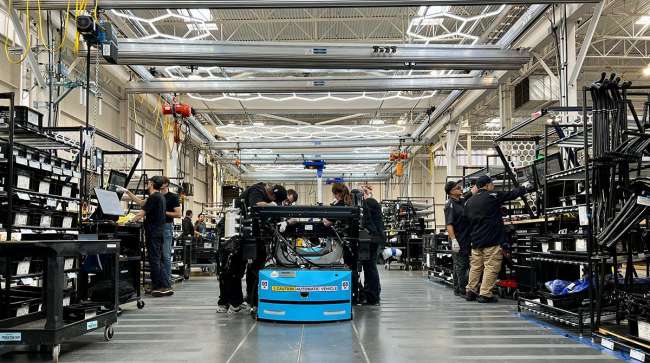Staff Reporter
Nikola Begins Production of Hydrogen Fuel Cell Class 8 Truck

[Stay on top of transportation news: Get TTNews in your inbox.]
Nikola began production of the Tre hydrogen fuel cell electric truck July 31 at its Coolidge, Ariz., factory, the company said.
CEO CHANGE: Girsky replaces Lohscheller at helm
Phoenix-based Nikola paused production at the Coolidge complex in late May for a retooling. Previously, the plant manufactured Tre battery-electric trucks.
When announcing the company’s first-quarter 2023 earnings May 9, Nikola said BETs would only be available on a “build-to-order” basis henceforth and its efforts would now be focused on fuel cell electric vehicles. Nikola is scheduled to report second-quarter 2023 earnings Aug. 4.
The changes to the Coolidge facility’s output were part of a strategy pivot to narrow the company’s focus to North America, manufacture just FCEVs, build out its HYLA hydrogen refueling business and reduce cash burn.
Some of the FCEVs are set to go to a unit of J.B. Hunt Transport Services Inc., which ranks No. 3 on the Transport Topics Top 100 list of the largest for-hire carriers in North America, behind only UPS Inc. and FedEx Corp. J.B. Hunt also ranks No. 2 on the top truckload/dedicated carriers list.
J.B. Hunt Transport Inc. will purchase 13 Nikola Class 8 trucks, the companies said July 31. The initial order will comprise 10 BETs and three FCEVs, with delivery of the first trucks expected in August, they said, and the deal ignited a stock price rally.
The trucks will service some of J.B. Hunt’s “key routes,” including in the greater Los Angeles and Phoenix areas. HYLA will supply the hydrogen and fueling infrastructure, the companies said. The Tre FCEV has a range of up to 500 miles.
“It’s important for us to be at the forefront of new technologies and innovative solutions that have the potential to change the way we move freight,” said Nick Hobbs, chief operating officer and president of contract services at J.B. Hunt. “These zero-emission trucks from Nikola advance our progress toward achieving our ambitious goal to reduce carbon emission intensity through viable solutions.”
Building out the currently sparse supply infrastructure to meet the original equipment manufacturers’ electric and hydrogen truck ambitions, and those of freight carriers such as J.B. Hunt, will make that easier.
On Aug. 1, the company said it had received $16.3 million in backing for open-network refueling stations from public-sector California entities. On July 5, Nikola said it had won a $41.9 million grant to build heavy-duty hydrogen refueling stations in Southern California. The company now has a $58.2 million cash pile for building seven refueling stations.
Nikola is also leaning on deep-pocketed private sector partners. In May, Nikola teamed up with Herndon, Va.-based Voltera to develop up to 50 refueling stations. Voltera is backed by Swedish investment group EQT.
The company then announced the sale of its Phoenix Hydrogen Hub project to Australian partner Fortescue Future Industries in July. FFI is a unit of one of the world’s largest iron ore producers, Fortescue Metals Group.
Nikola and FFI are in talks about the project providing fuel for the truck maker’s Class 8 rigs. The hub is expected to produce its first fuel by “the middle of this decade,” Nikola said, which added when the deal was announced that the project was in the final stages of its permitting process.
The coming few days are also likely to be key for Nikola in raising funding of its own. The company is set to hold its annual meeting Aug. 3 after two prior adjournments in June and July.
On each of the previous occasions, Nikola was unable to secure enough votes to win approval of a share issue paramount to financing production of the FCEV trucks.
Want more news? Listen to today's daily briefing above or go here for more info
Since the last adjournment, however, Delaware Gov. John Carney approved an amendment to Section 242 of the Delaware General Corporation Law.
As a result of the change, amending a company’s certificate of incorporation to boost its authorized share total would no longer need a majority of the outstanding common stock, just a majority of the shares voting.
Nikola previously said that had the amendment been on the books when the earlier two votes took place, then the company’s plan, known as Proposal 2, would have received the backing of enough shareholders.

